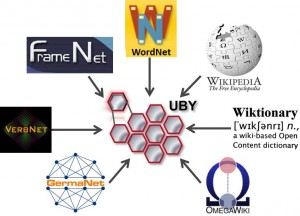UBY – A Large-Scale Unified Lexical-Semantic Resource (UBY 1.0) released
We are pleased to announce the release of UBY 1.0 –
based on the ISO standard Lexical Markup Framework (LMF), see UBY website.
- English WordNet, Wiktionary, Wikipedia, FrameNet and VerbNet,
- German Wikipedia, Wiktionary and GermaNet, and multilingual OmegaWiki.
A subset of these resources is linked at the word sense level.
There are monolingual sense alignments between VerbNet–FrameNet and VerbNet–WordNet as well as between WordNet–Wikipedia and WordNet–Wiktionary.
In addition, UBY provides cross-lingual sense alignments between WordNet and German OmegaWiki,
also including the inter-language links given in Wikipedia and OmegaWiki.
UBY-LMF captures lexical information at a fine-grained level by employing a large number of Data Categories from ISOCat.
- The union of a wide range of heterogeneous resources in a single, standardized resource.
- The linking at the word sense level between a subset of the resources.
UBY is complemented by a Java API, the UBY-API, and conversion tools (e.g., for converting the resources to UBY-LMF).
The UBY API and conversion tools are available at Google Code:
http://code.google.com/p/uby/
- Unified access to the various information types in the nine resources.
- Easy cross-resource access to the various information types in the resources.
A tutorial showing the use of the UBY-API can be found at
http://code.google.com/p/uby/wiki/ApiTutorial
at the UBY website.
We are grateful for the generous financial support from the Volkswagen Foundation and the German Research Foundation.
Please direct any questions or suggestions to uby-users@googlegroups.com
 Open Linguistics
Open Linguistics 